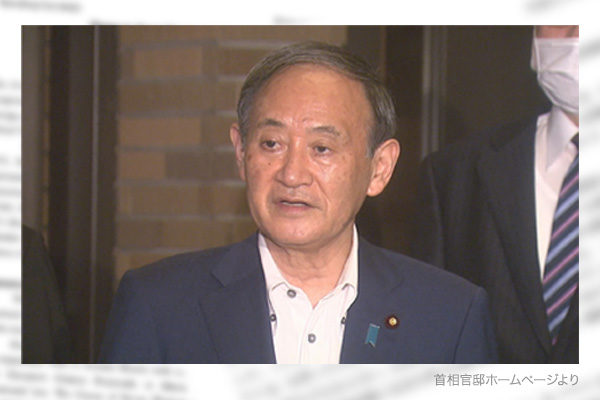On the night of September 25, Japanese Prime Minister Yoshihide Suga held his first telephone talks with Chinese President Xi Jinping since his assumption of the premiership earlier this month, conveying his concern to the Chinese leader over Chinese government ships’ provocative actions near the Senkaku Islands, Okinawa Prefecture. No mention was made of the Chinese leader’s planned state visit to Japan. Given the novel coronavirus pandemic originating from Wuhan, China, as well as human rights situation in Hong Kong, the Xinjiang Uygur Autonomous Region and the Inner Mongolia Autonomous Region, it is not timely to take up Xi’s planned visit. Although Japanese government officials suggested Suga as having kept the matter as a bargaining chip, the government should cancel the plan instead of keeping it.
Message of “concern” over Senkakus was too weak
Before the phone talks with Xi, Suga held such talks with top U.S., Australian and Indian leaders to reaffirm cooperation towards the realization of the “Free and Open Indo-Pacific” advocated by his predecessor Shinzo Abe. Suga thus effectively solidified a network to isolate China before the phone talks with the Chinese leader and might have delivered his message of succeeding Abe’s foreign policy.
Suga conveyed his “concern” about the Senkaku issue to Xi and voiced his hope to discuss Hong Kong and other issues in the future. But the message of concern on the Senkakus and human rights issue may be too weak. Suga should clarify Japan’s position.
As Suga pointed out the importance of keeping close communications between high-level officials including top leaders, Xi reportedly agreed. But Japan’s invitation of Xi as state guest is another story. While the development of stable, productive relations with China is desirable, human rights conditions in Hong Kong, Xinjiang and Inner Mongolia cannot be overlooked.
According to the Sankei Shimbun newspaper, senior Foreign Ministry officials noted that shelving the plan to invite Xi as state guest can become a bargaining chip in negotiations with China. The officials explained that China would refrain from responding radically to Japan’s criticisms against Chinese military actions, human rights suppression in Hong Kong and other issues until whether Japan would embrace Xi as state guest becomes clear.
Such idea indicates an overdependence on diplomatic techniques. Then Prime Minister Abe invited Xi to visit Japan as state guest in June 2019 before the situation changed dramatically through China’s introduction of the new national security law in Hong Kong.
Don’t be deceived by China’s smiling diplomacy
“The United States would not accept Xi as state guest,” said Michael Green, who served as senior director for Asian affairs at the National Security Council in the George W. Bush administration, in an interview with the Yomiuri Shimbun newspaper. “The American people and Congress would refuse to pay respect to the leader of any country that violates international rules and infringes on human rights so much,” he added. That is the same case with Japan.
Critic Shi Ping in his Twitter message said, “Japan is not in [what Liberal Democratic Party Secretary General Toshihiro Nikai terms as] a ‘peaceful atmosphere’ [for welcoming Xi]. If the Suga administration were to invite Xi as state guest, it would be abandoned by thoughtful Japanese people.” Suga should take the messages from Green and Shi Ping seriously.
If Japan invites President Xi as state guest, Japan’s Emperor and Empress would be invited to visit China in return. Beijing could attempt to invite the imperial couple to mend China’s international image hurt by the Wuhan virus pandemic and human rights suppression. Japan should not be deceived by China’s temporary smile.
Takashi Arimoto is publisher of Monthly Magazine SEIRON at the Sankei Shimbun newspaper.


